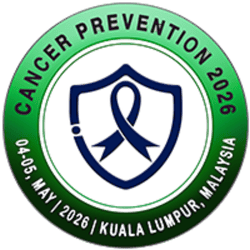Track: Cancer Prevention

Cancer prevention is the cornerstone of reducing the global cancer burden by addressing risk factors, enhancing early detection, and promoting healthier lifestyles. This session will emphasize the importance of preventive oncology, cancer epidemiology, and innovative healthcare research in identifying and mitigating cancer risks. By focusing on cancer screening strategies, lifestyle modifications, vaccination programs, and public health interventions, the session aims to improve global cancer initiatives and reduce cancer incidence across diverse populations. Discussions will highlight evidence-based cancer prevention strategies and collaborative approaches to empower individuals and communities to proactively safeguard their health.
Lifestyle Modifications and Behavioral Interventions for Cancer Prevention
Healthy lifestyle choices play a pivotal role in reducing cancer risks. This sub-topic highlights evidence-based interventions such as tobacco cessation, balanced nutrition, regular physical activity, and reduced alcohol consumption to minimize preventable cancer cases through effective public health interventions.
Role of Vaccination in Cancer Prevention Programs
Vaccination against viruses such as HPV and hepatitis B significantly reduces the risk of virus-associated cancers. This sub-topic explores preventive oncology approaches through immunization strategies, global vaccination initiatives, and their impact on lowering cancer incidence in diverse populations.
Environmental and Occupational Risk Factors in Cancer Prevention
This sub-topic focuses on reducing exposure to environmental carcinogens and workplace hazards. It examines how public health interventions, regulations, and awareness campaigns minimize risks associated with pollutants, radiation, and occupational exposures to enhance cancer prevention strategies.
Genetic Counseling and Hereditary Cancer Risk Reduction
Inherited genetic mutations play a significant role in certain cancers. This sub-topic emphasizes the importance of genetic counseling, predictive testing, and personalized prevention strategies to identify at-risk individuals and enable proactive cancer prevention and healthcare research advancements.
Community-Based Cancer Prevention Initiatives and Public Awareness
Community engagement is crucial for effective cancer prevention. This sub-topic explores outreach programs, health education campaigns, and local partnerships that improve awareness about preventive oncology, encourage regular cancer screening, and promote accessible cancer risk reduction measures.
Integrating Cancer Epidemiology into Preventive Oncology Research
Cancer epidemiology provides critical insights into risk trends and population health patterns. This sub-topic highlights how epidemiological studies inform targeted cancer prevention strategies, guide healthcare policies, and strengthen global cancer initiatives for high-risk and underserved populations.
Scientific Highlights
- Public Health & Cancer Awareness
- Cancer Prevention
- Screening & Early Detection
- Vaccination & Immunoprevention
- Environmental & Occupational Factors
- Complementary & Emerging Approaches
- Genetic & Personalized Prevention
- Cancer Biology and Genetics
- Cancer Immunology
- Molecular Oncology
- Hematology in Cancer
- Cancer Diagnosis and Therapeutic Approaches
- Oncology Research and Innovations
- Advanced Methods in Cancer Research
- Cancer Epidemiology and Prevention
- Future Trends in Prevention & Research
- Pediatric Oncology


